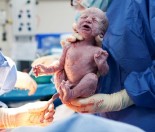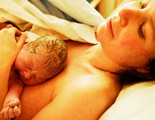This article explains what to expect when you return home after a Caesarean section. Life at home after a C-section can be pretty tough in the first weeks.
If you haven’t already, you should read the First 24 hours after a caesarean and Caesarean section – the first few days before this article. This will give you a better picture of the whole healing process.
The caesarean section rate in New Zealand continues to rise. This means a lot of Mums recovering at home from a c-section.
In 1984 the caesarean section rate in New Zealand was just 9.6%. By 2014 this had increased to 25% of all births in that year. And the actual figure could be even higher. The caesarean section rate at Auckland hospital was almost 35%.
Arriving home after a Caesarean
No doubt you have been dreaming of this moment! After anything between 3-7 days in a hospital bed who wouldn’t be? But with a bit of pre planning it will go a lot smoother –
- Ensure your husband/partner has left the house clean and tidy for you coming home. If he is not to be trusted then ask a friend or relative to pop in for you and get the washing up to date and give the house a quick vacuum.
- If anyone has offered to help then a meal waiting in the fridge for you on that first evening would be a huge bonus. New mums need to eat well, especially after a Caesarean section and takeaways do not always hit the mark. If you are reading this with a few weeks of pregnancy still to go then start filling your freezer with home made dinners – you will find this a life saver!
- Practise putting the car seat in and out of the car, using a teddy, so that you are pretty deft by the time you are bring your baby home.
- Ensure that you will have someone to help you in the first couple of weeks at least. If you have a toddler to consider also, then probably a mixture of other people taking the toddler for a play and coming to your house to help out there would be best. Be sure that the toddler does not feel excluded – giving them a couple of ‘very important’ jobs to do for the new baby will go a long way to preventing jealousy.
Guidelines for physical activity after a Caesarean
Remember you have just had major abdominal surgery! Your body will require time to heal the wound, which goes through layers of muscle, no matter how fit and healthy you are.
Do not lift anything other than your baby in the first few weeks – toddlers are very good climbers when they want to be. If your Caesarean is planned in advance, encourage your toddler to climb into the car seat/high chair well before the birth. It takes patience, but it is well worth it.
Delegate the “vacuuming exercise” for the first 6 weeks after the birth.
Driving: you will not be insured to drive for at least 6 weeks – check your insurance policy. Even after 6 weeks, practise an imaginary emergency stop before you venture out on a journey.
Supermarket shopping will be possible after a couple of weeks (you will be surprised at how tired it makes you feel though), but only with a helper to push the trolley and lift the shopping into the boot of the car – and out again.
Light housework will be possible in the first couple of weeks – sweeping, wiping benches etc.. Gradually increase this as you feel able. Stretching to hang out the washing may be uncomfortable in the first few weeks. Listen to your body – if it hurts then leave it or you are undoing the healing work of your body.
Showering will probably be easier than bathing for the first week or so – it is also recommended, particularly in hospital, as it lessens the risk of infection.
Midwife visits after a Caesarean section
Your Lead Maternity Carer will arrange visits at home for you, which may be by the same midwife who you have seen in the pregnancy, or may be provided by another midwife.
The first visit will be within 24 hours of you arriving home and thereafter depending upon your needs and requests.
If you have stitches or clips to be removed, this can be done at home, usually around day 5. Your midwife will observe the wound regularly to ensure it is healing normally as well as checking on the overall health of you and your baby at home.
Every day you will be noticeably more mobile and comfortable and this will make breastfeeding and latching baby a lot easier.
Usually women’s milk comes in on day 3, but it could be delayed a day or two after a stressful birth. Your midwife will help you with latching baby as your milk comes in and in finding positions that are comfortable for you.
Obstetrician follow up
As you leave hospital, or shortly afterwards, you will receive an appointment for a 6 week follow up check with your obstetrician.
This is a great opportunity to discuss the birth and your recovery. As questions occur to you over the first few weeks, write them down to take to your appointment.
If you are concerned about future pregnancies your specialist may be able to answer questions about this, although generally they will wait until your next pregnancy is underway before making any decisions about the care you will need.
After a Caesarean
There are some longer term consequences of having a Caesarean birth –
Some women feel a sensation of dragging or pulling over the scar for up to a year. Discuss this with your GP or your obstetrician.
Future pregnancies will be ‘higher risk’ and a great deal will depend upon why you had the Caesarean section.
Usually women are cared for by midwives in subsequent pregnancies, but are referred to an obstetrician during the pregnancy to plan for the birth and discuss the suitability of a vaginal birth following a previous Caesarean.
The majority of women who have had one previous Caesarean section have subsequent vaginal births, known as vaginal birth after a caesarean section (VBAC). These labours are monitored more closely to ensure that mum and baby are safe and well.
Many Mums feel very disappointed at having a Caesarean section – and for some women this can lead to feelings of inadequacy about the labour and birth. By talking to your Lead Maternity Carer and understanding the events that lead up to your birth most women are able to deal with these feelings.
It’s really important to voice how you are feeling in the early days, in order to try to resolve how you feel. An increased incidence of post natal depression may occur in women who are disappointed with labour and birth.
For information on successful breastfeeding visit Breastfeeding Tips and Breastfeeding Knowledge. Or check out 100s more great articles in our Babies section.





